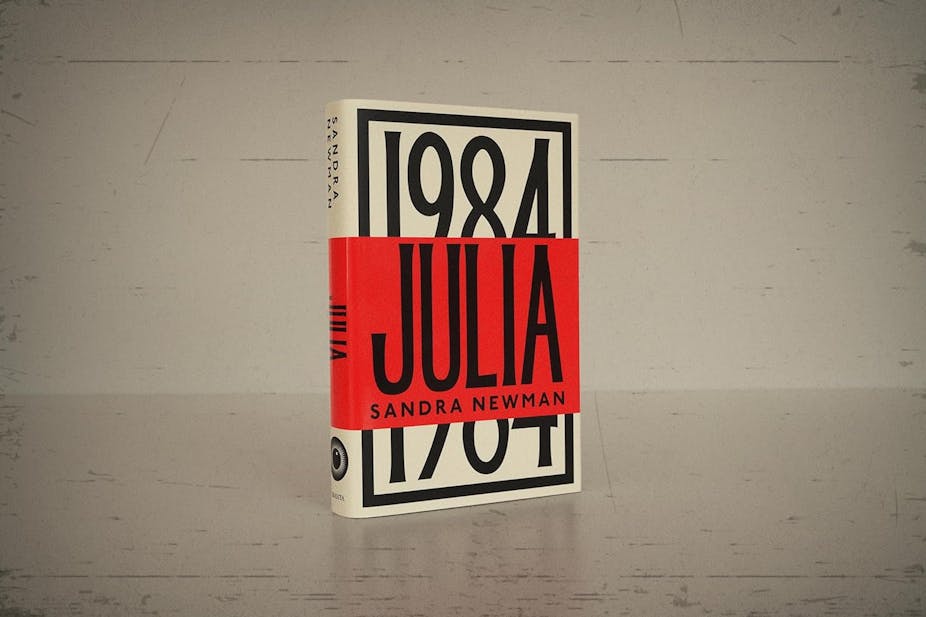George Orwell apologised to his close friends the writers Anthony Powell and Julian Symons for his novel, Nineteen Eighty-Four. He told one that it was “a good idea ruined” and the other that “I ballsed it up rather, partly owing to being so ill while I was writing it.”
For a work often seen as the greatest political novel in English of the past century, and certainly the best known and most quoted, this seems an unnecessarily harsh self-review. It’s clear that, ideally, he would have reworked the novel. As it happens, he wrote his apologies from a hospital bed. Orwell died barely six months after Nineteen Eighty-Four was published.
Nearly 75 years later, Sandra Newman’s new novel, Julia, is not so much a reworking of Orwell’s novel as it is a lively and intelligent reorientation of its focus. Her version is told not from the perspective of Orwell’s protagonist, Winston Smith, but that of his lover, Julia.
One indication of the change of emphasis is that Newman’s Julia has a surname – Worthing. This an example of what is often seen as a flaw in the original novel: that Julia is not fleshed out sufficiently. That she is merely Winston’s apolitical love object.
It could be counter argued that given that Winston is the central character – Orwell had thought of calling his novel The Last Man in Europe – it is not surprising that other characters are less three dimensional.
Newman does something similar herself. Winston is a relatively minor character in Julia, appearing only occasionally, if significantly, in key scenes reworked from Nineteen Eighty-Four that give Julia’s view on events.
Developing Julia
Of course, one of the ironies Newman uses is that many readers will come to her novel already “knowing” Winston from Orwell’s work.

But whereas in Orwell’s book Winston is the hero (or anti-hero), in Newman’s he is viewed more sceptically. Julia has a backstory that precedes him and her own life (spoiler alert) continues significantly beyond Winston’s famous final capitulation: “He had won the victory over himself. He loved Big Brother.”
Not giving away the details here of Julia’s life pre- and post-Winston preserves the many thoughtful and inventive plot twists, added scenes and characters Newman weaves into the detailed scenario that simultaneously deploys and extends elements from Nineteen Eighty-Four.
The George Orwell Estate approached Newman to write the novel, but it is sufficiently independent minded that it can be seen both as a companion to and a critique of the original.
For instance, Newman explores a plausible take on Julia’s willingness to become Winston’s lover. She develops this beyond their relationship to a more complex exploration of Julia’s perspective on the surveillance state and sexual politics. Through this we find that Julia has an exuberant and earthy imagination.
Given the relatively cardboard cut-out nature of the original character in Nineteen Eighty-Four, the foregrounding of her own sexual experiences and sexuality as well as her early life gives her a vitality in this retelling lacking in Orwell’s portrait.
This is not so surprising. Orwell’s female characters (even Dorothy Hare, the eponymous heroine of A Clergyman’s Daughter, 1935) tend to be slight figures. By contrast, Newman’s Julia Worthing is anchored and adventurous. She’s willing to take risks and to suffer for her actions in ways that might seem unlikely if not impossible with Orwell’s Julia.
Because we follow her, readers see and hear things of which Winston has no knowledge. A natural consequence of this different focus is that, in Newman’s novel, Winston is ignorant of important dynamics that Julia knows of and, in some cases, facilitates.
Julia’s world view
One implication of the new novel’s focus is that, because Julia is younger than Winston and has grown with less knowledge of a time before Big Brother, she is less oppressed by the world of Oceania.
His somewhat morose nostalgia contrasts with her more energetic view of reality, allowing her to deal with and resist explicit horrors in the present. And while his job reworking newspapers to suit the ever-changing reality promoted by the Party underpins a knowing rejection of it, her work in the Fiction Department allows for a cynical detachment.

These differences play out in the general moods of the respective books, so that while the world of Julia is dark and unappealing, it exhibits far fewer of the oppressive qualities that torment Winston in Nineteen Eighty-Four.
Julia’s more benign view of the world of Big Brother is a feature of Orwell’s portrait. But because in Newman’s novel readers spend more time in Julia’s physical and emotional world, the worldview presented through her is far less subjugated.
These differences also have stylistic implications. Orwell’s stark, gloomy prose is central to his novel’s unrelenting oppression, whereas Newman’s more vibrant style reflects Julia’s energetic resistance to the Party. At least to a point – in time she will have to come to terms with darker forces.
We need not choose one style or approach over the other. Nineteen Eighty-Four remains a totemic piece of political literature, but Julia offers contemporary readers new ways of thinking about Orwell’s novel while ingeniously constructing its own, fully realised, world.

Looking for something good? Cut through the noise with a carefully curated selection of the latest releases, live events and exhibitions, straight to your inbox every fortnight, on Fridays. Sign up here.

